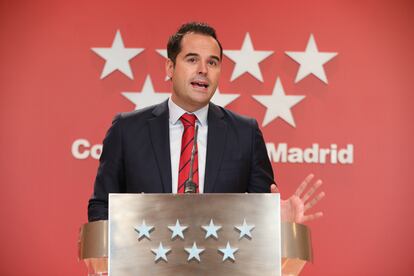Madrid considering new restrictions on mobility and restaurant businesses
The region has also called for “urgent” logistical support from Spain’s armed forces and more than 220 officers to enforce the selective lockdowns in 37 basic health areas

The Madrid government has given itself until Friday to decide whether new restrictions are needed to contain the spread of Covid-19 in the region, which has the highest cumulative incidence rate of Covid-19 in Spain, with 746.2 cases per 100,000 inhabitants. This may include cutting capacity in shops, bars and restaurants to 50%; closing bar counters; and reducing the business hours of all stores and hostelry, which could be told to close at 10pm.
These measures have already been applied to 37 basic health areas in the Madrid region, which have been confined since Monday due to their high incidence rates of Covid-19. Under the confinement measures, more than 850,000 residents in the affected neighborhoods are only allowed in and out for essential activities such as going to school or work, or to care for dependents.
On Wednesday, Madrid authorities also requested logistical support from the Spanish armed forces to help curb the spread of the coronavirus in these areas. “We have decided to formally request the urgent logistical support of the military to set up tents, carry out tests and disinfections in each of the areas subject to restrictions,” said Ignacio Aguado, the deputy premier of the Madrid region, at a press conference.
We will take action where we need to. We are not ruling out doing it across the regionMadrid premier Isabel Díaz Ayuso
In addition to setting new restrictions on capacity and business opening hours, the Madrid government is also considering extending the restrictions on mobility to more areas in the region, such as the 16 basic health areas – which are much smaller than a city district and can include several primary healthcare centers – that have a 14-day cumulative incidence rate of Covid-19 above 1,000 cases per 100,000 inhabitants. Despite the high transmission rate, these neighborhoods were not placed under selective lockdown along with the other 37 health areas.
If new restrictions are introduced on Friday, they will come into effect on Monday. The move would be an implicit admission that the measures adopted up until now by the regional government have not been enough to contain the pandemic.
“More specific measures may be proposed for basic health areas that the Madrid region may take, such as reducing the capacity of restaurants and bars,” said Antonio Zapatero, Madrid’s deputy health chief, on Wednesday. “Between now and Friday, we will have an answer.”
“The main goal is to avoid confining the entire Madrid region, which would lead to consequences that could be devastating to certain economic and social sectors,” he added. Despite warning of possible new restrictions, Zapatero was optimistic about curbing contagion: “There is data on the horizon that allows us to think that the situation is stabilizing and that there is a trend towards improvement.”
All establishments within the 37 confined health areas must close at 10pm, with the exception of gas stations, pharmacies and medical centers, and capacity at these has been reduced to 50%. In the case of the bar and restaurant sector, capacity has been cut to 50% in both indoor and outdoor seating areas, while consumption at bar counters has been banned.
The Madrid regional government will decide by Friday whether new measures are needed to contain the spread of Covid-19
In the rest of the Madrid region, the situation is very different. Stores can open until 1am (unless they are licensed to close earlier), bars and restaurants can operate at 75% capacity and bar counters are at 50% capacity. As of mid-August, nightclubs and nighttime bars across Spain have been closed.
The regional government wants to restrict social activity in order to reduce the risk of contagion, meaning that venues like bars may be targeted in any new measures.
“If we had thought, known, that this wave would get to this point this early, the closure of nighttime venues would have probably been greater still and happened even earlier,” said Madrid premier Isabel Díaz Ayuso in a radio interview with Onda Cero.
The Popular Party (PP) politician warned that the restrictions on the hostelry industry in the 37 health areas may be extended to the rest of the region. “I see that a bar in Vallecas, in Usera [two neighborhoods which have been confined], is complying with the rules and closing at 10pm. But then everyone is out drinking as if nothing was happening at 11pm, at midnight in Chamberí, Salamanca, Chamartín [districts which are not subject to the restrictions],” said Ayuso. “This does not go according to neighborhoods. We will take action wherever we need to. We are not ruling out doing it across the region.”
The Madrid government – which is run by a coalition between the PP and the center-right Ciudadanos (Citizens), with the support of the far-right Vox – needs to strike a difficult balance between curbing transmission and preventing further economic collapse. Health experts within the regional health department insist that more extensive measures are needed, while the finance and tax departments warn that overly strict restrictions could impact unemployment levels, tax revenue and gross domestic product (GDP).
Madrid seeks “urgent” logistical support from Spain’s armed forces
The deputy premier of Madrid, Ignacio Aguado, called on Wednesday for logistical support from the military to help with disinfection and testing in the confined areas. Starting next week, the regional government will begin carrying out fast coronavirus tests in the 37 health areas under selective lockdown. According to Aguado, these tests produce results in 15 minutes, meaning that a positive case can immediately go into isolation and stop the spread of the disease.
The deputy premier added that the regional government had also requested 222 national police and Civil Guard officers to enforce the selective lockdowns. Residents who break the restrictions on mobility could face fines of between €600 and €600,000, according to the current health protocols. But Madrid’s justice chief, Enrique López, announced on Wednesday that authorities will not issue fines until the Madrid High Court has ratified the health department’s order. “We will act with all due guarantees,” he wrote in a message on Twitter. “Citizens have rights and we have to respect them.”
In addition to officers and military support, the Madrid regional government has also called for an express reform to hire 300 doctors from other regions. The primary healthcare sector in Madrid is stretched to the limit and the region’s hospitals are also under increasing pressure, with 36.6% of intensive care beds occupied by coronavirus patients. The Madrid government promised to strengthen the healthcare sector, but has struggled to hire new doctors. This is due in part to the precariousness of the contracts on offer. In June, the government offered six-month contracts that could be cancelled at any moment, and which entailed working at an unfixed primary healthcare center, meaning that a doctor could be transferred to different facilities. According to unions, other regions offer contracts of between one and two years.
English version by Melissa Kitson.
Tu suscripción se está usando en otro dispositivo
¿Quieres añadir otro usuario a tu suscripción?
Si continúas leyendo en este dispositivo, no se podrá leer en el otro.
FlechaTu suscripción se está usando en otro dispositivo y solo puedes acceder a EL PAÍS desde un dispositivo a la vez.
Si quieres compartir tu cuenta, cambia tu suscripción a la modalidad Premium, así podrás añadir otro usuario. Cada uno accederá con su propia cuenta de email, lo que os permitirá personalizar vuestra experiencia en EL PAÍS.
¿Tienes una suscripción de empresa? Accede aquí para contratar más cuentas.
En el caso de no saber quién está usando tu cuenta, te recomendamos cambiar tu contraseña aquí.
Si decides continuar compartiendo tu cuenta, este mensaje se mostrará en tu dispositivo y en el de la otra persona que está usando tu cuenta de forma indefinida, afectando a tu experiencia de lectura. Puedes consultar aquí los términos y condiciones de la suscripción digital.









































